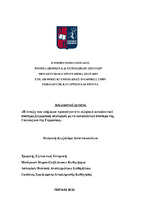Η ένταξη των ανήλικων προσφύγων στο ελληνικό εκπαιδευτικό σύστημα. Συγκριτική αποτίμηση με το εκπαιδευτικό σύστημα της Γαλλίας και της Γερμανίας.

Master Thesis
Συγγραφέας
Αποστολοπούλου, Θεοφανή - Αλεξάνδρα
Ημερομηνία
2023Επιβλέπων
Μενδρινού, ΜαρίαΠροβολή/
Λέξεις κλειδιά
Προσφυγόπουλα ; Ανήλικοι πρόσφυγες ; Εκπαίδευση προσφύγων ; Σχολική ένταξη ; Εκπαιδευτικές ανάγκεςΠερίληψη
Η ένταξη των ανήλικων προσφύγων στο εκπαιδευτικό σύστημα της εκάστοτε χώρας στην οποία εγκαθίστανται αποτελεί μείζον ζήτημα το οποίο επηρεάζεται από ένα πλήθος παραγόντων, το οποίο αφορά τις ιδιαιτερότητες των εμπλεκόμενων στην εκπαιδευτική διαδικασία. Τα ανήλικα προσφυγόπουλα είναι παιδιά που έχουν βιώσει εμπειρίες που δεν συνάδουν με το νεαρό της ηλικίας τους. Οι ένοπλες συγκρούσεις, οι διωγμοί, η εγκατάλειψη του τόπου καταγωγής, της οικίας, του κοινωνικού περιβάλλοντος και των λοιπών συγγενών, συνιστούν εμπειρίες τραυματικές ενώ κλυδωνίζουν τον ψυχισμό των ανθρώπων ατόμων και υπονομεύουν την ομαλή πνευματική και ψυχοκοινωνική τους ανάπτυξη. Στη χώρα εγκατάστασης ή στη χώρα φιλοξενίας, η είσοδος των προσφυγόπουλων στην εκπαίδευση συνιστά έναν παράγοντα που ενισχύει την κοινωνική ένταξη και σε δεύτερο χρόνο την ένταξη των ανθρώπων αυτών στην αγορά εργασίας, ενώ η εκπαίδευση μπορεί να ενισχύσει την ανάκτηση του αισθήματος σταθερότητας, ασφάλειας και αποδοχής που αυτά τα παιδιά έχουν ανάγκη. Γεγονός αποτελεί ότι με την άφιξη των ανθρώπων αυτών σε μια τρίτη χώρα, καλούνται να αντιμετωπίσουν ένα σύνολο ζητημάτων που αφορούν στη χορήγηση προσφυγικής ασυλίας, εφόσον το δικαιούνται ή στην έκδοση άδειας παραμονής ή στην ικανοποίηση του αιτήματός τους για μετάβαση σε άλλη χώρα της επιλογής τους. Στη συνέχεια, το ζήτημα στέγασης καθώς και κάλυψης των καθημερινών βιοποριστικών αναγκών αποτελούν ζητήματα που απασχολούν τους ανθρώπους αυτούς, θέτοντας την εκπαίδευση σε δεύτερη μοίρα. Η αποτελεσματική αντιμετώπιση των ζητημάτων που αναφέρονται παραπάνω ανάγουν σε ζήτημα ύψιστης σημασίας τη συνεργασία και την άμεση λήψη αποφάσεων των εμπλεκόμενων φορέων ενώ η ορθή διαχείριση των ανθρώπων αυτών αποτελεί πρωτίστως ζήτημα σεβασμού των Ανθρωπίνων Δικαιωμάτων. Στην παρούσα εργασία πραγματοποιείται μια συγκριτική αποτίμηση του τρόπου που οι ανήλικες πρόσφυγες εισήχθησαν στο εκπαιδευτικό σύστημα της εκάστοτε χώρας, ενώ σκοπός της εργασίας είναι να αναδείξει τις θετικές δράσεις καθώς και τα προβλήματα που παρέμειναν άλυτα στην περίπτωση των ανήλικων προσφύγων, όπως αυτά θα προκύψουν από τη βιβλιογραφική μελέτη.


